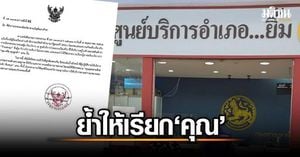LOS ANGELES -- The California Department of Motor Vehicles (DMV) found itself at the center of controversy after a personalized license plate, LOLOCT7, sparked outrage for seemingly mocking the October 7 attack on Israel by Hamas. The backlash unfolded quickly on social media, leading to an apology from the DMV and clarifications from the plate's owner.
The license plate was seen on a Tesla Cybertruck and drew attention after being highlighted by the activist group StopAntisemitism, which posted about the plate on X (formerly Twitter). The organization condemned the plate, stating it celebrated what they described as "terrorism against the Jewish people," prompting the DMV to act swiftly.
"This is unacceptable and disturbing," the DMV stated on its social media. The agency expressed deep regret for allowing the license plate to pass their review process, which should have filtered out any messages concerning hate speech or offensive language. The agency's statement asserted, "The use of hateful language is not only a clear violation of our policies but also of our core values to proudly serve the public and to create safe and welcoming roadways." They also informed the public of their plans to recall the controversial plate and revamp their internal review procedures.
Many observers interpreted loOloCT7 as having the letters "LOL," commonly understood as "laugh out loud," followed by "Oct. 7"—the date of the attack in Israel, which resulted in the tragedy of about 1,200 deaths and numerous kidnappings. Tensions escalated as social media users characterized the plate as highly insensitive during such traumatic events.
But the owner's family asserted the plate had been misunderstood. Consequently, the owner’s son, who requested anonymity, described the meaning behind the plate, breaking it down: "LOLO" means grandfather in Tagalog, "CT" stands for Cybertruck, and "7" signifies the owner's seven grandchildren. The intent behind this plate was a charming tribute, not malice. "I think this is just a total big misunderstanding," he stated.
The family vehemently condemned any association with the October 7 attacks, clarifying their Filipino background and expressing their shock at how quickly the narrative turned against them. "We have great empathy for anyone who has experienced any hatred," the son reiterated. He explained they had clearly articulated the meaning during the DMV's application process, adhering to protocols requiring applicants to explain the significance of their vanity plates.
Meanwhile, Liora Rez, the executive director of StopAntisemitism, shared her outrage over the plate's existence. "StopAntisemitism is appalled by the sickening display on a Cyber Truck plate... celebrating terrorism against the Jewish people," she said. Her organization emphasized the need for a zero-tolerance approach toward antisemitism, especially with rising levels of hate incidents across the country.
Despite their stated intent, the family opted to work with the DMV to change the contentious plate. The son commented on the need for clarity and urged anyone misinterpreting the plate to reflect on its true meaning. He explained, "We are a large Filipino family and this had nothing to do with the conflict in the Middle East. The misunderstanding over this plate was hurtful to us, and we hope to rectify it swiftly."
The DMV’s quick response to this incident reflects the increasing scrutiny over expressions and representations in public arenas. Their promise to implement enhanced review processes aims to prevent future oversights, acknowledging the emotive weight language carries, especially linked to recent global events.
With millions of personalized plates on California roads, this incident has drawn attention to how sensitive contextual interpretations of language can lead to potential misunderstandings. The DMV’s proactive approach to recalling the plate demonstrates their commitment to maintaining decorum on public roadways, balancing individual expression with community respect.
Public response has been divided, with some vigorously supporting the DMV’s actions, meanwhile others questioning the quickness to label the owner as insensitive without knowing the whole story. One comment made on social media reflected this sentiment: "Antisemitism is terrorism. Vile and disgusting. It must be rid of and those responsible held accountable," reminding of the volatile atmosphere during sensitive times.
The California DMV's handling of this situation serves as a case study for contemporary interactions between personal expression and communal values. Questions of intent, interpretation, and responsibility remain topical, inviting dialogue about the ways society navigates sensitive issues linked to identity, freedom of expression, and social responsibility.
Moving forward, both the DMV and the family involved can only hope for compassion and awareness from the public as they dispel misinterpretations and aim for positive dialogue surrounding potentially charged subjects.



